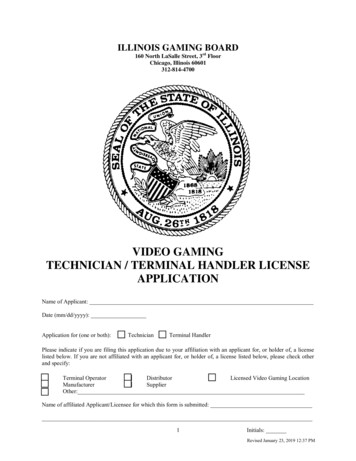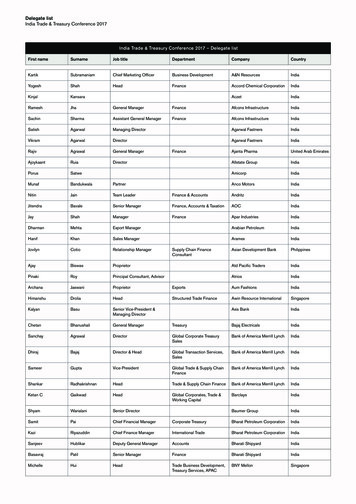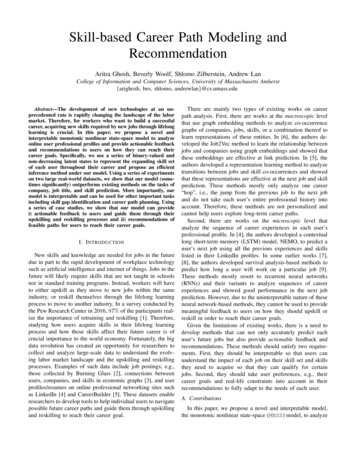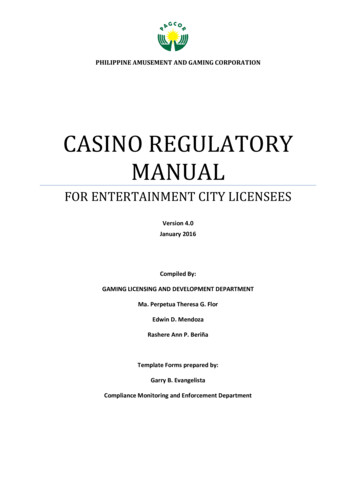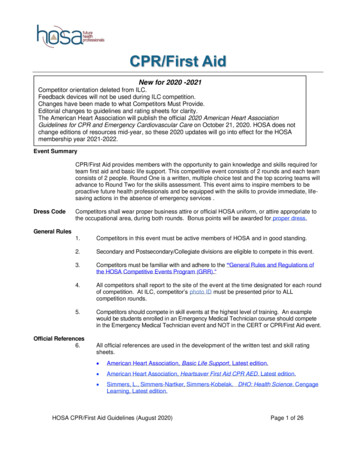
Transcription
TRFThe Rummy FederationSkill Gaming in IndiaThe changing landscapeJuly 2018
Skill-Gaming in India
Skill-Gaming in IndiaContentsIntroduction01Understanding the Regulatory Landscape02Gaming in India03Detailed Profile of the Indian Gamer04Enablers of the Skill-Gaming Industry05Way Forward063
Skill-Gaming in India Note:Some of the views and opinions expressed herein are those of the survey respondents (Survey conducted by Rummy Operators) and do notnecessarily represent the views and opinions of Deloitte in India.While this report talks of various companies and regulatory landscape in this industry, neither Deloitte in India or The Rummy Federation(“TRF”) will be liable for any loss, damage, cost or expense incurred or arising by reason of any person using or relying on information in thispublicationUnless otherwise specified, neither party takes any responsibility of the data cited in the report. This report does not purport to represent theviews of the companies and industries mentioned in the report.Reference herein to any specific commercial product, process, or service by trade name, trademark, manufacturer, or otherwise, does notnecessarily constitute or imply its endorsement, recommendation, or favouring by the Deloitte in India, TRF or any agency thereof or itscontractors or subcontractors.4
Skill-Gaming in India IntroductionThis document is a report collated basedon desktop research and is not a surveyThe Games Industry is undergoingdramatic changes. As the industrytransitions from being limited to a friendsand family activity to a thriving onlineactivity, participation and engagementin gaming is becoming widely recognisedand pursued. Growth in the country’sgaming industry is being fuelled byenhanced connectivity, changing needsin social interaction and a growing youthpopulation base. The universal appeal andsocial nature of the gaming industry offersa multitude of opportunities for directmonetization, user engagement and brandpromotions.For the purpose of regulating monetaryofferings in the gaming industry, Indianlaws differentiate between games of skilland games of chance. There is a strictprohibition on participation and offerof money in games of chance. However,games of skill are treated differently inthat they are comparable to any otherentertainment activity. The differentialtreatment which is accorded to games ofskill and games of chance, as the formerbeing permitted and the latter beingprohibited has been a historic feature ofIndian law which has flowed into the Indianstatute from the prevalent principles underthe British ruled India.A game is classified as a skill game basedon the outcome of the game whichpredominantly depends on the skills ofthe players and not on a chance event andhence is considered legal in all aspectsincluding in social settings, clubs, casinosand online.Although gaming practices date back tothe early 17th century, the advent of adigital age has revolutionized the gamingindustry. The internet has opened the doorto a whole new realm of opportunities forthis industry. As the trend of online gamingprogresses, companies have substantiallyimproved the gaming experience thatthey offer. The fierce competition betweencompanies has been a result of the everexpanding user base of customers whohave a wide range of choices of onlinegames. Therefore, gaming providerscontinue to look for ways to expand theirservices and ensure continued userengagement.The growth trajectory of this industry hasled to an increasing need of a regulatoryframework to ensure integrity andtransparency.This paper gives an overview of the gamingindustry in India while highlighting thecurrent regulatory landscape and drawinginsights on the growth and revenuegeneration in skill gaming in India. It alsoemphasizes the behavioural pattern ofIndian skill gamers and their need foronline engagement.With proliferation of entertainmentoptions across online media platforms,the online gaming industry, representsa significant avenue for growth. A clearregulatory regime which, inter alia, doesnot disrupt innovation and growth will allowIndian operators to access and ride thistide, generating significant revenue andemployment opportunities in a burgeoningindustry.5
Skill-Gaming in IndiaUnderstandingthe RegulatoryLandscapeOverview of Betting andGamingGaming is perhaps as old as mankind and has beenglobally practised legally as well as illegally. Theattitude of society towards gaming has varied acrosstime and geography and in most cases, laws havesupported wagering on activities that are based on skilland prohibited betting on games of chance. Bettinginvolves transaction of money or any property and thisarrangement may be arrived face to face or throughvirtual means. The revolution of Internet technologyhas opened new dimensions of gaming and hascreated a global market for activities on which peoplecan legally place a wager in their respective jurisdiction.Today, people place their wagers over phone, personalcomputer etc. Easy access to internet gaming sites,having a global presence has made regulation ofgaming an important issue. Telecommunicationtechnology and global bank transfers have linkedgaming hosts into networks. But despite thesedevelopments, ‘skill’ or ‘chance’ is still a decisive factorin determining the legality of a gaming businessin India.6Skill gaming is different from prohibited gambling orgaming on games of chance which is understood to begambling in nature. The expression “gaming” found inall the State gambling laws has been interpreted by theSupreme Court in the case of Dr. K.R. Lakshmanan v.State of Tamil Nadu and Anr., (1996) 2 SCC 226“32. The expression ‘gaming’ in the two Acts has to beinterpreted in the light of the law laid-down by thisCourt in the two Chamarbaugwala cases, wherein ithas been authoritatively held that a competition whichsubstantially depends on skill is not gambling. Gamingis the act or practice of gambling on a game of chance.It is staking on chance where chance is the controllingfactor. ‘Gaming’ in the two Acts would, therefore, meanwagering or betting on games of chance. It would notinclude games of skill like horse-racing. In any case,Section 49 of the Police Act and Section 11 of the GamingAct specifically save the games of mere skill from thepenal provisions of the two Acts. We, therefore, hold thatwagering or betting on horse-racing - a game of skilldoes not come within the definition of ‘gaming’ underthe two Acts.”
Skill-Gaming in India Statutory Provisions inIndia – OverviewThe two main enactments dealing with gaming in Indiaare the pre-Independence Public Gambling Act, 1867(PGA) and the Prize Competitions Act, 1955 (PCA).The PGA criminalises the act of gambling in a publicforum in India and the keeping of a ‘common gaminghouse’. Common gaming-house is defined as anyhouse, walled enclosure, room or place in which cards,dice, tables or other instruments of gaming are keptor used for the profit or gain of the person owning,occupying, using or keeping such house, enclosure,room or place, whether by way of charge for the use ofthe instruments of gaming, or of the house, enclosure,room or place or otherwise howsoever.As per the Seventh Schedule to the Constitutionof India (Entries 34 and 62 of List II), the stategovernments have been authorised to make lawson betting and gambling. Therefore, where a statelegislation on gambling exists, it prevails over the PGA,which is a central legislation promulgated earlier intime. Accordingly, in addition to the PGA, a numberof states in India have enacted legislation to governgambling and gaming within these states7
Skill-Gaming in IndiaSkill Gaming –Regulatory InsightsThe differential treatment accorded to games of skilland games of chance, with the former permittedand the latter prohibited, has been a historic featureof Indian law. Section 12 of the Public Gambling Actexempts games of skill from the penal provisionsagainst gambling – ‘Nothing in the foregoing provisionsof this Act contained shall be held to apply to any gameof mere skill wherever played’.In the case of Dr. K.R. Lakshmanan v. State of TamilNadu and Anr., (1996) 2 SCC 226, the Supreme Court(“SC”) of India has interpreted the words “mere skill” toinclude games which are preponderantly of skill andhave laid down that (i) the competitions where successdepends on substantial degree of skill will not fall intocategory of ‘gambling’; and (ii) despite there beingan element of chance, if a game is preponderantly agame of skill, it would nevertheless be a game of “mereskill”. Hence, games which satisfy test of skill are notregulated under gambling legislations.There have been various legal precedents to argue thata game which requires substantial degree of skill for aplayer to be successful will be considered as a game ofskill and does not amount to gambling. Some of thesejudgements have been reproduced below:8 In the case of State of Andhra Pradesh v. KSatyanarayana, the Supreme Court held that thethirteen card game of rummy was not a game entirelybased on chance. The division bench, while allowingthe game of rummy to be played in clubs, observed“The game of Rummy is not a game entirely of chancelike the ‘three-card’ game mentioned in the Madrascase to which we were referred. The ‘three card’game which goes under different names such as‘flush’, ‘brag’ etc. is a game of pure chance. Rummy,on the other hand, requires a certain amount of skillbecause the fall of the cards has to be memorisedand the building up of Rummy requires considerableskill in holding and discarding cards. We cannot,therefore, say that the game of Rummy is a game ofentire chance. It is mainly and preponderantly a gameof skill.” In the case of Dr. K.R. Lakshmanan v. State of TamilNadu the Supreme Court held Horse-racing is asport which primarily depends on the special abilityacquired by training. It is the speed and staminaof the horse, acquired by training, which matters.Jockeys are experts in the art of riding. Between twoequally fast horses, a better trained jockey can touchthe winning-post. ‘Gaming’ in the two Acts would,therefore, mean wagering or betting on games of
Skill-Gaming in Indiachance. It would not include games ofskill like horse-racing. We, therefore,hold that wagering or betting on horseracing - a game of skill does not comewithin the definition of ‘Gaming’ underthe two Acts. The court further followedthe legal position affirmed in the twoChamarbaugwala cases and quoted “We must hold that as regards gamblingcompetitions, the petitioners before uscannot seek the protection of Article19(1)(g).(5) As regards competitionswhich involve substantial skill however,different considerations arise. They arebusiness activities, the protection ofwhich is guaranteed by Article 19(1)(g)” In the case of Shri Varun Gumber v. UnionTerritory of Chandigarh and Ors., thePunjab and Harayana High Court heldthat:–– The competitions where successdepends upon the substantial degreeof skill are not gambling; and–– Despite there being an element ofchance, if a game is preponderantly agame of skill it would nevertheless be agame of “mere skill”.Based on the submissions and contentionsof respondent-company and factualposition admitted in writ petition, Judgewas of the view that playing of fantasygame by any participant user involvesvirtual team by him which would certainlyrequires a considerable skill, judgmentand discretion. The participant has toassess the relative worth of each athlete/sportsperson as against all athlete/sportspersons available for selection.He is required to study the rules andregulations of strength of athlete or playerand weakness also. The several factorsas indicated above submitted by therespondent – company would definitelyaffect the result of the game.The Judge further, expressed that gamblingis not a trade and thus, is not protected byArticle 19(1)(g) of Constitution of India andthus, the fantasy games of the respondent-company cannot said to be falling withinthe gambling activities as the same involvesthe substantial skills which is nothing butis a business activity with due registrationand paying the service tax and incometax, thus, they have protection grantedby Article 19(1)(g) of Constitution of India.Accordingly, the writ petition standsdismissed. In the case of Auth Rep, Head Infotech(India) Pvt. Ltd., Hyderabad & Anr vs.Chief Secy, State of Telangana, Hyderabad& 3 Ors (“the Writ”)The Telangana State Gaming (Amendment)Ordinance, 2017 (“Ordinance I”) waspromulgated by the Governor of the stateof Telangana (“State”) on June 17, 2017 toamend the Telangana State Gaming Act,1974 (“the Act”).On 20 June, 2017, Ordinance I waschallenged before the High Court ofHyderabad (“Court”) by several rummyoperators. Pending final outcome ofthe proceedings before the Court, onJuly 8, 2017, the State passed anotherOrdinance, the Telangana Gaming (SecondAmendment) Ordinance, 2017 (“OrdinanceII”) to amend the Act further.The Challenge to Ordinance I: The Act, likemost State gaming enactments excludesgames of skill from its purview. Therefore,prohibitions under the Act do not applyto games of skill. Ordinance I added anexplanation stating that games of skillwhich have part elements of chancecannot be termed ‘skill games’. Ordinance Ifurthermore specifically stated that Rummywas not a skill game as it involved partchance.The challenge to Ordinance II: Ordinance Ionly made gaming within common gaminghouses an offence and removed Rummyspecifically from the ambit of games of skill.Ordinance II further amended the law tospecifically make online games of skill anoffence in the state by entirely removed theexemption to all types of games of skill.The challenges to the Ordinances I & IIand the subsequent Telangana Gaming(Amendment) Act 2017 passed pursuantto the said Ordinances are based onseveral grounds, most importantly, thatthis amendment has upset the law laiddown by the Supreme Court upholding theexclusion of games of skill from the ambitof gambling laws and that this Act violatesthe fundamental right to do business andprofession under Article 19(1)(g) of theConstitution of India.9
Skill-Gaming in IndiaTertiary Laws1994The Cable Television Network Rules, 1994The Cable Television Network Rules, 1994101 prohibit the advertisement of gamblingactivities. However, as set out in rule 7 the advertisement of games of skills, such as horseracing, rummy and bridge, is not prohibited.1999Foreign Exchange Management Act, 1999Remittances of Income from lottery winnings, racing/riding, sweepstakes etc. areprohibited under the Act, 1999 read with Rule 3 and Schedule 1 of the Foreign ExchangeManagement (Current Account Transaction) Rules, 2000. The Foreign ExchangeManagement (Transfer or Issue of Security by a Person Resident Outside India)Regulations, 201794 and the Consolidated Foreign Direct Investment (FDI) Policy, 201795issued by the Government of India, vide clause 5.1(a) prohibit both, “Foreign DirectInvestment” and “investment by a person resident outside India” in entities conducting“lottery Business including Government/private lottery, online lotteries etc.” and “Gamblingand Betting including casinos etc.” by clause 5.1(b). The Consolidated FDI Policy and theForeign Exchange Management (Transfer or Issue of Security by a Person Resident OutsideIndia) Regulations, 2017 are reflective of the National Policy of India in matters pertainingto foreign direct investment and investment by a person resident outside India. Similarly,collaborations in foreign technology in any form whatsoever, for the purposes of gamblingand betting activities is also prohibited under clause.2010Telecom Commercial Communications Customer Preference Regulations, 2010The Telecom Commercial Communications Customer Preference Regulations, 2010 havebeen issued by The Telecom Regulatory Authority of India, with the objective of prohibiting“Unsolicited Commercial Communications”. These regulations have been framed inresponse to various complaints made against spam calls and SMSs. Therefore, any sort ofunsolicited commercial communication pertaining to gambling or betting will attract theprohibition contained in these Regulations.201110Information Technology (Intermediaries Guidelines) Rules, 2011 (IntermediariesRules)The Intermediaries Rules, which have been framed under Section 87(2)(zg) read withSection 79(2) the Information Technology Act, 2000. Rule 3(2)(b) thereof requires‘intermediaries’ like internet service providers, network service providers, search engines,telecom operators etc. not to host or transmit any content which inter alia relates to orencourages gambling. Further, Rule 3(4) requires intermediaries to remove content relatingto or encouraging gambling within thirty-six hours, either “upon receiving actual knowledgeor on being notified to do so by the appropriate government or its agency that anyinformation, data or communication link residing in or connected to a computer resourcecontrolled by the intermediary is being used to commit the unlawful act.”
Skill-Gaming in IndiaGaming in IndiaGaming has a universal recreationalappeal for people across all ages andsocioeconomic groups. The gamingindustry has witnessed a paradigm shiftwith the evolution of television, digitaland online gaming models leading to asurge in the number of online gaming sitesover the last few years. Given the highgrowth potential of the gaming industry inIndia, many foreign entities are exploringpossibilities to set up operations here.While operating gaming businesses iseasier in some countries of the worldwhere games of chance and games of skillare regulated, the business environment isnot as conducive in India since the laws arestringent.Gambling as per most legislations isunderstood as “the act of wagering orbetting” for money or money’s worth ona game of chance. However, it does notinclude01. Games of ‘mere skill’02. Games of Chance (Casinos, regulatedGambling):03. Lotteries (covered under Lottery Laws)11
Skill-Gaming in IndiaGames of Mere SkillA “game of skill” is one where success depends principally upon superior knowledge, training, attention,experience, adroitness, personal attributes and capabilities of the player. It is a game in which, while theelement of chance cannot be entirely ruled out, it is the element of skill on the part of the participants thatplays a dominant role in determining the outcome of the game. Games of skill are identified as a separatecategory because various states in India (excluding Assam and Orissa, Telangana) have codified gambling actsthat exclude games of skill from the ambit of gambling. The popular online games in India that have beenrecognized as games of skill include Horse Racing, Rummy and Fantasy Sports. RummyThere are many different card games played in the world, but rummy is one of the most popular. There areseveral different formats of the game, such as Canasta and basic rummy. However, these formats are all basedon the same basic concept: collecting melds. A meld is a run of cards, which can be either sets of three or fourcards of the same rank, or three or more sequential cards in the same suit. Skill in Rummy is displayed in theactivity of memorising discarded cards and mentally estimating the probability of obtaining useful cards fromthe closed deck or the recent discard. This engaging aspect of gameplay in rummy is the skill required to win thegame and is therefore a very popular competitive game amongst millions of gamers in India and abroad. Thisformat of skill games is dominated by 4-5 major operators who have been operating for more than 5 years. Fantasy SportsFantasy sports games are games which involve users drafting fantasy teams based on certain conditions froma list of players scheduled to play live games on a given day. The users pay an entry fee to enter a contest andit is pooled in for distribution among the users (“Entry Pool”) after deduction of a service/administrative fee byfantasy sports games providers. The users draft their teams based on their application of knowledge (gatheredthrough systematic research), attention, experience and adroitness regarding the relevant sport. Based onthe performance of the players selected by the user to draft his/her team, the user collects points. The usersare ranked based on the points their selected players accumulate throughout the contest as per their on-fieldactions and scoring metrics for the contests. The various games offered by Fantasy sport operator in Indiaincludes Cricket, Football, Basketball and Kabbadi. This format of game is seeing a lot of new entrants but theformat is currently dominated by one of the major operator in this space. \ Horse Racing:Most states have adopted the Public Gambling Act 1867 with an amendment pertaining to horse racing, wherebyit has been specifically excluded. Horse racing and betting on horse racing has been classified as a game of skillby the Supreme Court. Therefore, it is also permitted in licensed premises. Online Game of Skill - RegulatedThere is no specific definition of online gambling under the state enactments. However, skill-based orpreponderantly skill based games can be played online in all states except the states of Telangana, Assam andOdisha. Furthermore, in the State of Nagaland, these games can be played only on websites that are licensed bythe State of Nagaland.The following are the card based games regulated by the respective government:State of Nagaland: Nagaland Prohibition of Gambling and Promotion and Regulation of Online Games Skill Act2015 covers Poker, Rummy, Nap, Bridge, etc.State of West Bengal: The West Bengal Gambling and Prize Competition Act 1957 covers Poker, Rummy, Nap, etcGames of ChanceGames of chance for stakes fall within the ambit of the gambling acts of the states and are largely prohibited.Some states, for example Goa, have created exceptions within their gambling acts, allowing for authorized gaming.Thus, licenses are issued in the state of Goa for games of chance in casinos, which are operated on land as wellas offshore. The state of Sikkim has also promulgated the Sikkim Casino Games Act 2004, which allows for casinooperations within the state and through Sikkim Online Gaming (Regulation) Act 2008 online gambling for Roulette,Pontoon, Bingo, Casino brag, Poker dice, and certain other games is permitted through issue of License.Lotteries:The Central Lotteries Act of 1998 governs lotteries and gave state governments the authority to run such gamblingrestricting it to a maximum of one draw per week. This act covers the whole of India and enables the stategovernments to organise and promote lotteries and sell them via distributors and agents.12
Skill-Gaming in IndiaUnderstanding the SkillGaming Industry in IndiaMajority of theOperators in skillgaming industry arecorporate entitiesregistered in Indiaas a Private LimitedCompany.Over the last fewyears, the industryhas grown rapidlyand the same iswitnessed throughthe increase inthe revenue of theoperators.Not only has therevenue of theindustry grownsignificantly, alsothe number ofoperators areincreasing with newentrants in ion,income levelof consumers,improvingdemographics andrising disposableincome are majorfactors for drasticchange in theindustryThe growth ofthe industry isalso assisting ingeneration ofemployment,contribution in theform of taxes to thegovernment andCSR spends.Basis the various judgements and the state enactments across majority of the states in India, skill gaming in India(Real Money Games) covers Card Games (Primarily Rummy), Fantasy Sports, Horse Racing and eSports. Thissection focuses on Rummy and Fantasy Sports which is growing exponentially compared to the traditional form ofgaming i.e. Horse Racing.13
Skill-Gaming in IndiaCorporate StructureThe gaming industry in India is dividedinto two segments, i.e. the offline gamingindustry (gaming clubs, casinos) and theonline gaming industry (gaming websites).All the Operators in these segmentsare corporate entities, registered inIndia as private limited companies. Thebusiness of these corporate entities ismanaged in a structured manner, guidedby the principles and requirements ofcorporate governance. This adherence tolaws ensures that there is transparencyand integrity in all transactions by thebusinesses as well as end users.14
Skill-Gaming in IndiaGrowing TrendsThe last few years have led to a remarkable growthin the revenue figures of this industry. The calculatedCAGR for the last 3 years for card based games on thebasis of change in revenue is 67.58 percent generatinga total revenue of about 730 crores in 2016-17 andFantasy Sports has grown by 199.69 percent generatinga total revenue of about 67 crores in 2016-17.Growth Trend of the Indian Gaming Industry*Calculated figures of revenue for the FY 17-18, FY 18-19 and FY-19-20 on the basis of CAGR. As Fantasy Sports is having anexponential growth due to IPL and busy sports seasons we have not included the projections.*12 companies (Rummy only) in card gaming industry and 9 companies in Fantasy Sports were considered for calculating revenue (InFantasy Sports, One operator contributes to 90 percent of the revenue in this format).Users Gaming Industry (Millions)60505040302010020.6916.37 1711.548.0965.7.301.3F.Y 13-14F.Y 14-15Card GamesF.Y 15-16F.Y 16-17F.Y 17-18Fantasy Sports*#The above user database is of 3 card operators contributing 90 percent of the total revenue booked in FY 16-17 by 6 cardoperators who are members of TRFBased on online information15
Skill-Gaming in IndiaGiven the emergence and growing adoption of 3G/4G network mobile services coupled with increasingproduction of games, the gaming industry in India is anticipated to grow significantly in the future.Rapid changes in the gaming industry are expected to offer new opportunities for developers,publishers as well as technology partners in the future, and this is anticipated to boost growth in theIndian gaming market. Below is the table showing the new entrants and increase in the number ofoperators in card based games and fantasy sports.Number of Operator in the Gaming d GamesFantasy SportsF.Y. 14-15F.Y. 15-16F.Y. 16-17TotalF.Y. 17-18*Only major active Indian operators in the industry are considered in the above table for card games. The numberrepresents the cumulative number of operators in a FY.The growth of this industry has contributed to the employment opportunities not only in thisindustry but across industries specifically IT and related services attracting millennials and creatingopportunities in non-conventional sectors16
Skill gaming in India Detailed Profileof the IndianGamer17
Skill-Gaming in IndiaMarketDemographicsand tion TrendsA World bank study of population trend by age groupin India, depicts population below the age of 45 was984.73 million in 2011 which increased to 1.01 billionin 2016 resulting in increase of gaming consumer baseby 2.84 percent and male population to grow at CAGRof 1.00 percent. India with more than 75 percent ofpopulation below the age of 45, makes it one of thelargest potential market for online gaming in terms ofvolume.In recent yearsthe behaviour, preferences and lifestyleof Indian consumers has changed drastically. Increasein disposable income, increased consumer awareness,penetration of internet and social media have resultedin the consumer demanding beyond just necessities. The Indian approach has shifted from need-basedchoices to more aspirational consumption patternsand such spending is anticipated to more than doubleby 2025.Moreover, the Indian population is becomingincreasingly urban, as the total urban population was31.99 percent and has increased to 33.53 percent ofthe total population in 2017. Increasing urbanization isone of the factors that have contributed to growth ofthe gaming market in India.Economic TrendsAccording to the International Monetary Fund (“IMF”),India had a gross domestic product (“GDP”) of nearlyINR 167.73 trillion at current price in 2018, growingfrom INR 87.36 trillion in 2012. Increasing per capitaGDP will have an impact on disposable income andconsumption patterns of the Indian consumers.18A study on the Indian consumer suggests that ifIndia continues to grow at the current pace, averagehousehold incomes will triple over the next twodecades, making India the world’s fifth-largestconsumer economy by 2025, a significant shift up fromthe current 12th position. Putting in perspective thegrowth that India is witnessing, the 1.01 billion peopleunder the age of 45 coupled with substantial increasein smartphone ownership and data usage makes Indiathe largest potential market for online gaming. Thenumber of internet users have increased at a CAGR of19 percent from 2012 to 2017 and smartphone usershave increased by 47 percent. Increasing penetrationof low-cost smartphones with multiple features andthe ease of internet connectivity in urban markets havebeen key factors that has led to the emergence andrapid increase of online gaming in India. As more andmore people are getting accustomed to smartphoneownership, service providers focused around this ITecosystem are flushed with new opportunities.
Skill-Gaming in IndiaIndian Skill-GamerThis section covers the profiling of an Indian OnlineGamer based on a study conducted by RummyOperators.Understanding the Indian Skill-Gamer20-44YEARSAn average Indian online gamer ispredominantly a male between the agegroup of 20-44.Gamers from south India dominate thisonline gaming formatGamers are engaged for mainly tworeasons – human connection (socialinteraction) and relief (stress)Mobile phones are the most preferredplaying device followed by LaptopFriends and family members are generallyaware of gamer’s onlin
6 Skill-Gaming in India Understanding the Regulatory Landscape Overview of Betting and Gaming Gaming is perhaps as old as mankind and has been globally practised legally as well as illegally.


